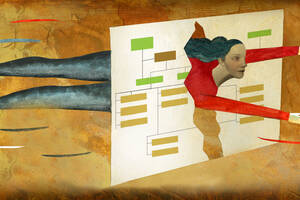New research into that question calls to mind the curious case of one much-maligned researcher.
It began in 1986, when six researchers published a major paper in the journal Cell. Among the authors were a little-known assistant professor named Thereza Imanishi-Kari, who had devised the paper’s central experiment, and Nobel Prize winner David Baltimore.
But soon after the paper was published, Imanishi-Kari was accused of falsifying her data.
Because the research had been funded by the National Institute of Health, a Congressional investigation followed. The NIH barred Imanishi-Kari from receiving any federal grants for ten years (though she was later exonerated). Baltimore, on the other hand, was still able to continue his research and went on to become president of Caltech.
Why were the consequences for the two researchers so different? Could Baltimore’s renowned status, relative to Imanishi-Kari, have something to do with it?
In a new paper, Kellogg’s Benjamin Jones, a professor of strategy, and Brian Uzzi, a professor of management and organizations, try to find out. The team wondered, “Do the junior person and the eminent person on a team receive equal blame for a retraction?” says Uzzi.
They looked at retracted academic articles with multiple authors and compared how frequently each author continued to be cited by fellow scholars following the retraction. Crunching the numbers, they found that the more junior members of the team saw a substantial decline in citations of their work, while the more eminent members experienced little or no change.
“That double standard should make us question how we give credit and how we give blame,” says Uzzi.
The Matthew Effect
The research is a novel investigation of a phenomenon known as the “Matthew Effect.”
Coined by the sociologist Robert K. Merton in 1968, the effect is named for a verse in the New Testament book of Matthew: “For to everyone who has, more shall be given, and he will have an abundance.”
The interpretation in the world of scientific research: when multiple scientists collaborate and the paper is well-received, it is automatically assumed this success is disproportionately due to the brilliance of the team’s most eminent author.
In other words, those who are “rich” in reputation get richer with every success.
Prior research has found evidence that the Matthew Effect indeed exists in a variety of fields. “It’s been observed in academia, in technology, in the creative arts,” says Uzzi, “basically in just about any situation where you can’t observe the actual contributions to a product, and you’re trying to make assumptions” about the roles of individual contributors.
But Jones and Uzzi, who teamed up with Ginger Zhe Jin of the University of Maryland and Susan Feng Lu of Purdue University, were interested in looking at the flip side of the Matthew Effect: Who is considered responsible when things go wrong?
Two very different stories seemed plausible. Since the more established author receives the lion’s share of credit for a success, perhaps that author will also receive the bulk of the blame for a mistake.
Alternatively, there could be a “Reverse Matthew Effect”: The eminent author’s reputation might allow him or her to deflect the negative consequences of the retraction, while the lesser-known authors are not so lucky. Or, as Matthew put it in the second half of the verse: “But from the one who does not have, even what he does have shall be taken away.”
Retractions Don’t Affect Everyone Equally
Although the problem of apportioning credit or blame in group endeavors is universal—from grade-school class projects to the highest reaches of the United States government—Jones, Uzzi, and their colleagues decided to focus on scientific research, where they felt the blame for a discredited project would be more easily quantifiable.
Using the Web of Science research database, they found nearly 500 papers published between 1993 and 2009 that had had multiple authors and that had been retracted. Retraction, a potentially career-damaging blow in academia, happens when there is ample evidence that a paper fabricated data, plagiarized the work of others, committed a major error, or had other serious problems.
The researchers determined a retracted author’s degree of eminence based on the number of papers they had previously published and the number of citations those papers had garnered. Next, they calculated how many times each author’s earlier, pre-retraction work was cited by other researchers after the retraction. Essentially, how willing were others to overlook the black mark of a retraction when looking at the researcher’s other work? The team compared these citation counts to those of a “control” group, consisting of authors of similar papers that had been published without incident.
The researchers found that the more eminent members of the team typically continued to be cited like the control group, a sign that their work was still respected. Their less well-known collaborators, on the other hand, saw their citations dip below the control group.
“The eminent person will be protected,” Jones says. “The junior person, who gets less credit when things go right, will get more discredit when things go wrong.”
Furthermore, the effects of a retraction are long-standing; the number of citations for the non-eminent authors continues to fall even five years later.
Are Power Dynamics in Academia to Blame?
Why does the more junior person get more blame than their coauthors?
Jones says there are two possible explanations. The first is that more eminent authors have typically published a larger body of work than their greener coauthors.
“When you’ve seen someone’s prior work,” he says, “you’re confident in that person. But the person without that reputation, you can’t judge. It’s realistic to assume that the person you haven’t seen before is likely to be the source of the problem.”
The other explanation is far less generous: Perhaps the better-known member of the team uses his or her social and institutional power to deflect the blame from him- or herself and to scapegoat less prominent collaborators.
Furthermore, it is entirely possible that there are other factors besides experience influencing the power dynamic—namely, race, gender, and social class—but neither this team nor anyone else has studied that yet.
Whatever the cause, Uzzi thinks that the unequal assignment of blame could actually encourage irresponsible behavior. “If an eminent author knows that they are buffered from blame, it may make them less likely to be careful in their research, knowing that if anything does happen, the blame will fall on somebody else,” he says.
Although Jones and Uzzi focused on the scientific community, they suspect that their findings may apply far beyond academia.
In particular, Uzzi would like to test the Reverse Matthew Effect in the political arena. “Our top leaders are often very quick to accept credit for a growing economy, the stock market going through the roof, and so forth,” he says. “But they may also be very quick to assign blame to others if the economy is going down and the stock market is crashing.”
And for those who work on teams, the paper can be read as a warning: “It does suggest that if you’re charting your own career path, working with powerful people can be a risk,” says Jones. “Be choosy about who you hitch your own reputation to.”




